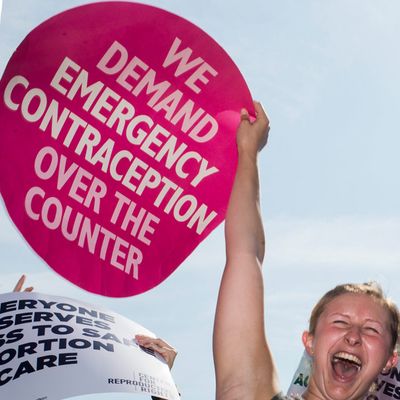
The 21st century has not been great for women.
Despite living in an era of empowerment conferences, you-go-girl advertisements, and self-avowed feminist celebrities, “since the mid-1990s, the fraction of men and women who support gender egalitarianism has stopped its upward trend,” according to a new overview of women’s social and political progress published by the Russell Sage Foundation. The researchers lay out ample evidence to suggest that women made great strides between 1960 and 1990, but conclude that since then, “women’s progress has slowed or stalled” in America.
Women, overall, are less happy than they were 50 years ago — and although we are still happier than men, that gap is closing. American women’s longevity has fallen behind that of women in other developed countries. The wage gap persists, and is exceptionally large for women of color. We still can’t get CEO-level promotions or seats on corporate boards, even though more women than men are earning college degrees. Since 1990, women’s share of advanced degrees has not grown. And when it comes to women entering lucrative fields that were once dominated by men, “a period of rapid change in the 1970s and 1980s was followed by slower change and then stagnation,” the researchers write. A woman might be running for president, but in other races, the number of women has flatlined. The report doesn’t even touch on the lack of basic rights for trans women, or the still-rampant issues of domestic violence and sexual assault, to make the case for how stuck we really are.
To use the least-feminist analogy ever, maybe this is like how it’s so much easier to lose the first ten pounds than the last. We made progress quickly in the second half of the 20th century because there was such a huge gap between what women wanted and what they had support and access to do. As the gap has narrowed, it’s gotten harder to close. The problems still in the way are thornier and more fundamental — less likely to be solved with a single policy shift.
The researchers cite three possible reasons for the fact that the gleaming, modern 21st century hasn’t brought about much progress for women. One, many people still believe that men and women are innately different. Two, most people still expect women to take responsibility for domestic work and child-rearing. And three, work has become all-consuming for everyone, and so women in particular make compromises.
Much of the report focuses on women’s professional lives. The changes we thought would continually improve the workplace for women haven’t worked out that way. There is conflicting evidence as to whether women in management positions help all women in the workplace. Some studies find that they have no effect on gaps in pay and promotion. One study found that the Family and Medical Leave Act actually reduced the likelihood of women being promoted. Even as overt discrimination has become the stuff of HR complaints, we’re still left with discrimination that is more pernicious, casual, and harder to prove in a court of law. Sexism, the researchers note, often takes the form of “cognitive biases.” Even if people don’t want to be sexist, or claim they don’t hold sexist beliefs, they still treat women differently.
What women and men want has changed. What we actually do has not. Even as we’ve worked to close certain gender gaps — education, wages — the gap is widening between the beliefs we claim and the reality we live. Consider the fact that, at graduation, 17 percent of baby-boomer women expected their husbands’ career would come first. It ended up being 40 percent. For Gen-X women, 25 percent expected an egalitarian marriage, but 39 percent ended up with their own career on the back burner. But it’s hard to have too much sympathy when the research shows that “both men and women continue to prefer relationships in which men have higher status than their female partners.”
I’d like to believe that women who don’t partner with men are faring better in achieving equality in their homes and relationships, but the five decades’ worth of research cited in the report renders them all but invisible. We also don’t learn much about women who have always had to balance intense pressure to earn money with intense pressure to raise children. Nor do we hear from women whose very existence challenges the notion of innate gender difference.
And this, more than anything, may point to the core reason that women’s march toward equality has stalled. If our progress is dependent on getting over dated notions about gender differences, forming more egalitarian partnerships, and making work more humane for everyone, we need to stop looking to professional-track, straight white women for the answers. The 21st century has proved definitively that these women don’t have them. We should be looking to people outside the gender binary for advice on how to construct an identity unbound by conventional rules. We should not just accept but encourage unconventional family structures, rather than trying to make change within families that still resemble mid-century nuclear ideals. And we should be supporting higher minimum wages, not just cheering more women on toward graduate degrees.
A century is a long time, and I don’t think unstalling progress is as difficult as the research might suggest. But first, it requires reframing.




